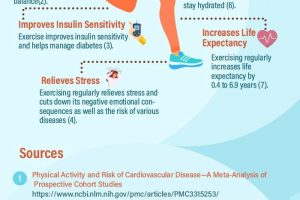Discovering the Benefits of Exercise for Optimal Health

When it comes to maintaining overall health and wellness, regular exercise stands out as a cornerstone. The benefits extend beyond mere aesthetics, playing a crucial role in both physical and mental health.
- Discovering the Benefits of Exercise for Optimal Health
- The Underlying Motivation
- Importance of Regular Exercise
- Physical Benefits
- Mental Benefits
- Exercise and Disease Prevention
- Cardiovascular Health
- Diabetes Prevention
- Exercise for Weight Management
- Burning Calories
- Building Muscle Mass
- Enhancing Mood and Mental Well-being
- Reduction of Stress
- Improved Sleep Quality
- Exercise for Boosting Energy Levels
- Physical Stimulation
- Psychological Boost
- Strengthening Immune System
- Enhanced Immune Response
- Stress Reduction and Immunity
- Exercise for Better Cognitive Function
- Increased Blood Flow to the Brain
- Improved Mood and Brain Health
- Increasing Longevity
- Healthy Aging
- Reduced Risk of Chronic Illness
- Making Exercise a Sustainable Habit
- Setting Realistic Goals
- Finding Enjoyment
The Underlying Motivation
For many, the motivation to exercise often stems from personal experiences. Perhaps it was a moment of realization, like a friend reporting their achievements in a fitness program, or an instance where one felt sluggish and drained. These moments can become turning points, igniting the desire for a more active lifestyle. Consider these motivating factors:
- Increased Energy: Feeling rejuvenated and less tired throughout the day.
- Improved Self-Image: Gaining confidence through fitness milestones.
- Social Connections: Engaging in group activities or classes, fostering friendships.
With such compelling reasons, it’s no wonder that incorporating exercise into daily routines can yield impressive results. Let’s dive deeper into the myriad benefits of regular exercise that go beyond the surface level.
Importance of Regular Exercise
Understanding the significance of regular exercise is essential for anyone looking to improve their quality of life. Exercise is not just about fitting into that favorite pair of jeans; it encompasses a spectrum of physical and mental benefits that can transform an individual’s day-to-day experience.
Physical Benefits
On the physical side, exercise can improve overall health in several ways:
- Weight Management: Engaging in regular physical activity helps maintain a healthy weight.
- Stronger Muscles and Bones: Weight-bearing exercises enhance bone density and muscle strength, reducing the risk of osteoporosis later in life.
- Enhanced Stamina: Over time, consistently working out can significantly boost endurance and energy levels.
In my own experience, I found that committing to a regular workout routine not only toned my body but also energized my mornings, making physical tasks feel less daunting.
Mental Benefits
The mental advantages are equally profound. Regular exercise often leads to:
- Reduced Anxiety: Physical activity helps boost mood by releasing endorphins.
- Sharper Focus: Many report improved concentration and mental clarity after working out.
- Better Resilience: An active lifestyle can build mental toughness, helping individuals cope with stress.
I’ve personally noticed that after a good workout, my ability to tackle daily challenges improves, showcasing the powerful link between physical exertion and mental resilience. With these compelling benefits, the motivation to stay active becomes clearer.
Exercise and Disease Prevention
With an understanding of the physical and mental benefits of exercise, it becomes clear how crucial it is for disease prevention. Regular physical activity is a powerful ally in the fight against several chronic conditions.
Cardiovascular Health
One of the most significant impacts exercise has is on cardiovascular health. Engaging in regular aerobic activities—like walking, running, or swimming—can lead to:
- Lower Blood Pressure: Exercise helps reduce the force of blood against artery walls.
- Improved Cholesterol Levels: Regular activity can increase HDL (the good cholesterol) while lowering LDL (the bad cholesterol).
- Reduced Heart Disease Risk: Active individuals typically face a lower risk of heart attacks and other cardiovascular issues.
For instance, since I started jogging several times a week, my last doctor’s appointment revealed significantly improved blood pressure and cholesterol levels, confirming the positive changes my body was experiencing.
Diabetes Prevention
Exercise also plays a vital role in managing and preventing diabetes, particularly Type 2 diabetes. By maintaining a healthy weight through regular physical activity, individuals can:
- Improve Insulin Sensitivity: Exercise helps the body use insulin more effectively.
- Regulate Blood Sugar Levels: Staying active can lead to better control of glucose levels post-meal.
- Reduce Risk Factors: Regular workouts can decrease the chances of developing insulin resistance.
In my journey, adopting a routine filled with activity has not only helped shed some extra pounds but has set up a strong defense against diabetes—a poignant reminder of how my lifestyle choices can steer me toward a healthier future. Continued engagement in exercise not only enhances physical fitness but is a proactive approach to disease prevention.
Exercise for Weight Management
Having established the crucial role of exercise in disease prevention, it’s essential to explore how it aids in effective weight management. Striking a healthy balance is key for long-term health, and regular physical activity is a cornerstone of this endeavor.
Burning Calories
One of the most straightforward benefits of exercise is its role in burning calories. Different types of activities can help achieve this:
- Aerobic Activities: Exercises like running, swimming, and cycling can burn a significant number of calories in a single session.
- High-Intensity Interval Training (HIIT): Short bursts of intense activity followed by rest can lead to maximum calorie burn in a shorter period.
For example, after incorporating a mix of cardio and HIIT routines into my weekly workout schedule, I noticed a substantial difference in my energy levels and overall weight.
Building Muscle Mass
In addition to burning calories, engaging in strength training helps build muscle mass, which is crucial for effective weight management:
- Increased Basal Metabolic Rate (BMR): More muscle means your body burns more calories at rest.
- Improved Body Composition: Strength training helps reduce fat mass while promoting lean muscle growth.
I found that focusing on muscle-building exercises not only sculpted my physique but also elevated my metabolism, making weight maintenance feel much more manageable. Together, these elements of exercise create a powerful strategy for anyone looking to maintain a healthy weight.
Enhancing Mood and Mental Well-being
Having explored the significant benefits of exercise for weight management, it’s essential to highlight its profound impact on mood and mental well-being. Incorporating physical activity into daily life can positively transform emotional health.
Reduction of Stress
One of the most immediate effects of exercise is its ability to alleviate stress. When you work out, your body releases endorphins—known as the “feel-good” hormones. This process can lead to:
- Immediate Mood Boost: Even a brisk walk can brighten your day.
- Long-term Stress Resilience: Regular exercise builds better coping mechanisms for future challenges.
I remember feeling overwhelmed during a busy work week; however, taking just 30 minutes for a jog helped clear my mind and restore my focus, helping me tackle my tasks more effectively.
Improved Sleep Quality
Moreover, exercise can significantly improve sleep quality, which in turn enhances mental well-being. Regular physical activity contributes to:
- Easier Sleep Onset: Falling asleep becomes quicker and more seamless.
- Deeper Sleep Stages: Quality sleep helps with mental restoration.
Personally, after starting a fitness routine, I noticed my sleep patterns improved noticeably. Waking up feeling refreshed gave me the energy I needed to face each day. With these powerful mental health benefits, it becomes even clearer how exercise serves as a vital tool for enhancing emotional and mental well-being.
Exercise for Boosting Energy Levels
Transitioning from the mental health benefits of exercise, another remarkable advantage is its ability to boost energy levels. Many people often feel drained after a long day, but engaging in regular physical activity can turn that fatigue around.
Physical Stimulation
One of the primary ways exercise enhances energy is through improved blood circulation. When you move, your heart pumps faster, delivering oxygen and nutrients more efficiently throughout your body. This leads to:
- Increased Stamina: Over time, regular exercise builds endurance, making daily tasks feel easier.
- Enhanced Oxygen Utilization: Your body learns to use oxygen more effectively, reducing feelings of fatigue.
I can personally attest to this—since I incorporated a daily routine of brisk walking or light jogging, I’ve consistently felt more energized throughout the day.
Psychological Boost
Furthermore, the psychological effects of exercise add to your zest for life. As the endorphins kick in, they elevate your mood, making you feel more alert and lively. This can lead to:
- Heightened Motivation: A boost in energy often translates to increased productivity.
- Better Focus: With more energy, tackling tasks becomes much simpler.
By fostering both physical and psychological energy, regular exercise truly becomes a catalyst for enhancing overall vitality and zest for life.
Strengthening Immune System
Continuing the discussion on the benefits of exercise, one area that often goes unnoticed is its powerful role in strengthening the immune system. Regular physical activity not only keeps you fit but also equips your body with better defenses against illnesses.
Enhanced Immune Response
Engaging in consistent exercise can lead to several physiological changes that bolster your immune system:
- Improved Circulation: Exercise promotes better blood circulation, allowing immune cells to travel more efficiently throughout the body.
- Reduced Inflammation: Regular activity helps decrease levels of inflammation, which is beneficial for overall health.
From personal experience, I’ve noticed that since I adopted a routine of moderate exercise, I’ve been less susceptible to seasonal colds and flu. It seems like my body has become more resilient!
Stress Reduction and Immunity
Additionally, exercise helps in reducing stress, which can be a significant factor in immune function. Lower stress levels mean:
- Better Hormonal Balance: Exercise helps keep stress hormones, like cortisol, in check.
- Increased Sleep Quality: Better sleep contributes to a stronger immune response.
Incorporating regular physical activity into my life has undoubtedly strengthened my immune system, helping me stay healthier and more vibrant. With such formidable support, it’s clear that exercise is a key player in promoting robust health.
Exercise for Better Cognitive Function
Building on the physical and immune benefits of exercise, it’s equally important to recognize its profound impact on cognitive function. Regular physical activity does wonders for the mind, enhancing focus, memory, and overall mental performance.
Increased Blood Flow to the Brain
One of the primary ways exercise boosts cognitive function is by improving blood flow to the brain. This results in:
- Enhanced Nutrient Delivery: Increased circulation ensures that vital nutrients and oxygen reach brain cells more effectively.
- Neurogenesis: Exercise stimulates the production of new brain cells, particularly in the hippocampus, which is associated with memory and learning.
For me, after a quick workout or even just some stretching, I often find that my mind feels clearer and more alert, making it easier to tackle tricky tasks.
Improved Mood and Brain Health
Furthermore, exercise plays a major role in reducing anxiety and depression, both of which can hinder cognitive abilities. Key benefits include:
- Elevated Mood: Regular activity releases endorphins, helping to create a more positive mental state.
- Better Resilience to Stress: Managing stress effectively can lead to improved focus and problem-solving skills.
By making exercise a regular part of my routine, I’ve noticed not only a boost in my physical health but also a remarkable enhancement in my mental clarity and cognitive function. It’s a testament to how movement can truly invigorate both the body and mind.
Increasing Longevity
As we wrap up our exploration of exercise and its numerous benefits, a compelling area to highlight is its remarkable impact on longevity. Engaging in regular physical activity can profoundly influence not just how long you live, but also the quality of those years.
Healthy Aging
One of the key aspects of exercise in relation to longevity is its role in promoting healthy aging. Regular activity helps combat age-related decline by:
- Maintaining Muscle Mass: Strength training helps preserve muscle and strength as we age.
- Enhancing Mobility: Staying active promotes flexibility and balance, reducing the risk of falls.
I recall reading about seniors who were still hiking and biking well into their 80s, attributing their vibrant health to their commitment to staying active throughout their lives.
Reduced Risk of Chronic Illness
Moreover, exercise plays a crucial role in decreasing the risk of chronic diseases, particularly those that can shorten lifespan, such as:
- Heart Disease: Regular activity strengthens the heart and improves circulation.
- Diabetes and Obesity: Consistent exercise maintains a healthy weight and improves metabolic health.
Witnessing these benefits firsthand, I’ve committed to regular exercise not just for the immediate gains but for the long-term promise of a healthier, longer life. By making movement an integral part of daily routine, we can all take significant strides toward increasing our longevity and enhancing the quality of our years.
Making Exercise a Sustainable Habit
Having explored the myriad benefits of exercise, it’s essential to address a critical aspect: making it a sustainable habit. The key lies in developing a routine that fits seamlessly into your lifestyle, ensuring that you can enjoy the advantages for the long haul.
Setting Realistic Goals
Begin by setting achievable goals. Overloading yourself with ambitious targets can lead to frustration and burnout. Instead:
- Start Small: Commit to just 10-15 minutes of exercise a day.
- Gradually Increase Intensity: As you build confidence, gradually up your workouts.
I started with short daily walks and gradually incorporated strength training, which not only helped establish my routine but also kept it enjoyable.
Finding Enjoyment
Another crucial factor is finding activities you genuinely enjoy. This could be anything from dancing to hiking or even group classes. Consider:
- Exploring New Activities: Trying out different workouts can keep things fresh.
- Working Out with Friends: Exercise becomes more fun when shared with others.
In my experience, joining a local running group transformed my exercise routine into a social event, making it easier to stay committed. By tailoring exercise to your tastes and gradually building it into your life, it’s possible to establish a lasting habit that enriches both your health and happiness. With consistency, you can enjoy all the incredible benefits of regular exercise for years to come.




